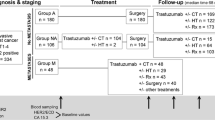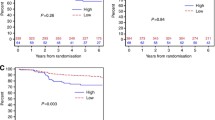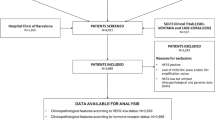Abstract
Purpose
In our recent studies, we demonstrated that breast cancer treatment by anti-EGF-R antibody resulted in a significant therapeutic effect in vivo. Furthermore, we were able to elucidate histopathologic parameters with an impact on therapy success. The aim of this study was the evaluation of EGF-R and Her2/neu protein expression on a large series of primary breast cancer, to elucidate if anti-EGF-R antibody therapy is a new therapeutic option for patients who are Her2/neu negative and where, therefore, anti-Her2/neu antibody treatment is not applicable.
Methods
We analyzed EGF-R and Her2/neu protein expression of 149 consecutive primary breast cancer specimens by fully quantitative enzyme-linked immunosorbent assay. For evaluation of stochastic independence, we used χ2-test as goodness-of-fit test.
Results
We found EGF-R and Her2/neu expression as stochastically independent in primary breast cancer.
Conclusions
Anti-EGF-R antibody treatment is a potential therapeutic option for patients with Her2/neu negative breast cancer.
Similar content being viewed by others
References
Cobleigh MA, Vogel CL, Tripathy D, Robert NJ, Scholl S, Fehrenbacher L, Wolter JM, Paton V, Shak S, Lieberman G, Slamon DJ (1999) Multinational study of the efficacy and safety of humanized anti-HER2 monoclonal antibody in women who have HER2-overexpressing metastatic breast cancer that has progressed after chemotherapy for metastatic disease. J Clin Oncol 17:2639–2648
Mendelsohn J, Baselga J (2000) The EGF-Receptor family as targets for cancer therapy. Oncogene 19:6550–6565
Slamon DJ, Godolphin W, Jones LA, Holt JA, Wong SG, Keith DE, Levin WJ, Stuart SG, Udove J, Ullrich A, et al (1989) Studies of the HER-2/neu proto-oncogene in human breast and ovarian cancer. Science 244:707–712
Solbach C, Roller M, Ahr A, Loibl S, Nicoletti M, Stegmueller M, Kreysch HG, Knecht R, Kaufmann M (2002a) Anti-epidermal growth factor receptor-antibody therapy for treatment of breast cancer. Int J Cancer 101:390–394
Solbach C, Sterner-Kock A, Roller M, Schnuerch HG, Stegmueller M, Caspar-Bell G, Schumm-Draeger PM, Kaufmann M, Knecht R (2002b) Antitumor effect of MAb EMD 55900 depends on EGF-R expression and histopathology. Neoplasia 2002b4:237–242
Yarden Y, Sliwkowski MX (2001) Untangling the ErbB-signalling network. Nat Rev Mol Cell Biol 2:127–137
Acknowledgements
This work was supported by Immundiagnostik (Bensheim, Germany) and "Heinrich und Erna Schaufler Stiftung". We thank Ekaterini Kourtis for excellent technical assistance.
Author information
Authors and Affiliations
Corresponding author
Additional information
C. Solbach and M. Roller contributed equally to this work
Rights and permissions
About this article
Cite this article
Solbach, C., Roller, M., Budischewski, K. et al. EGF-R and Her2/neu overexpressing tumors: independent collectives for treatment of breast cancer by specific monoclonal antibody-therapy. J Cancer Res Clin Oncol 129, 250–251 (2003). https://doi.org/10.1007/s00432-003-0421-2
Received:
Accepted:
Published:
Issue Date:
DOI: https://doi.org/10.1007/s00432-003-0421-2




